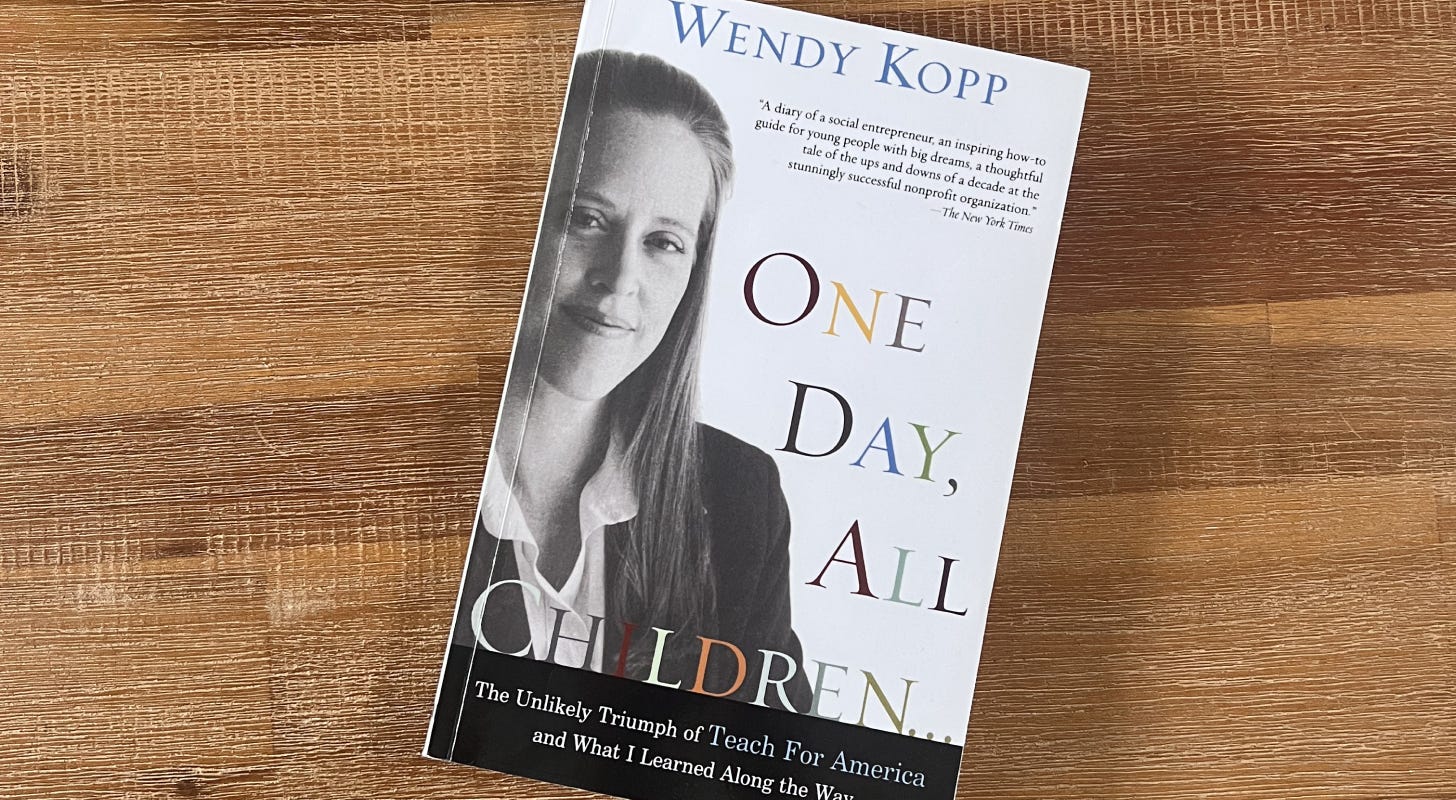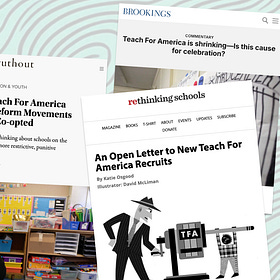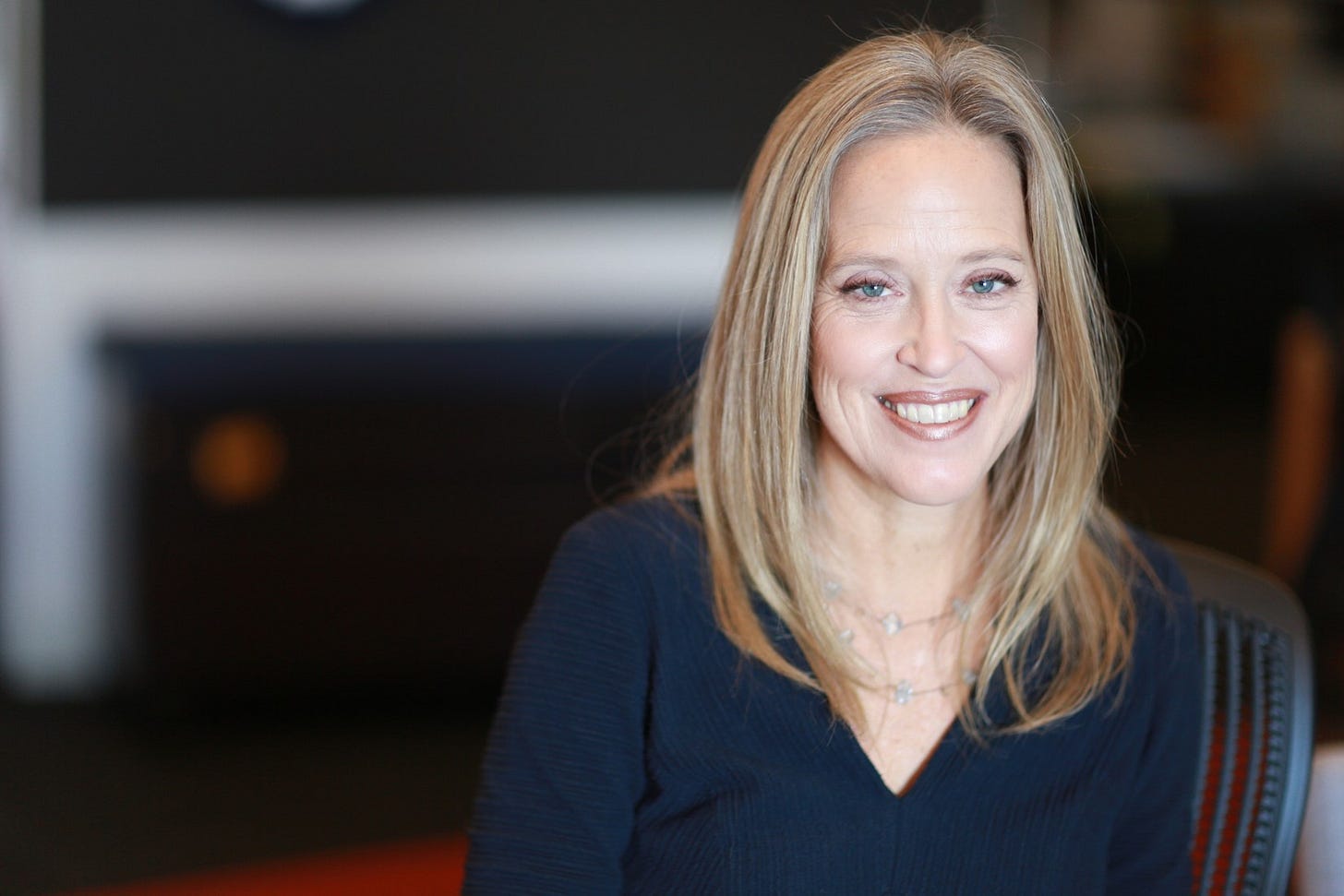Wendy Kopp: Lessons Learnt
At 21 years old, she raised $2.5 million and recruited 500 college students into a new scheme called Teach for America. Three decades later, what has Wendy Kopp learnt?
In the 1990s, the term social entrepreneur came into mainstream use to describe the visionary innovators who married business thinking and social purpose to change the world. Wendy Kopp, the audacious young founder of Teach For America, was the archetype.
While writing her thesis at Princeton, Kopp developed an idea to recruit hundreds of students to become classroom teachers in some of the United States’ poorest communities. Her blueprint included a rigorous selection process and an eight-week residential training program, after which college graduates would begin a two-year teaching placement.
In her first year after graduating, Kopp raised $2.5 million to make the idea a reality. Her record of fundraising meetings reads like a who’s who of corporate America. Nearly 500 college students became the first ‘corps members’ of Teach for America (TFA) in 1990. The organisation grew to a peak of over 5,000 incoming participants per year in the 2010s—placed in schools all across the US.
To date, over 60,000 people have become teachers through the scheme. TFA inspired Teach First in the UK, and many other schemes around the world.
In 2007, Kopp co-founded Teach for All, a global network of organisations with a similar mission and model to TFA. She stood down from TFA in 2013 but remains the CEO of Teach For All.

In its formation, TFA came in for fierce criticism: privileged do gooders would be clueless as teachers in low income schools; they would abandon their kids after their two year commitment, doing more harm than good. Accusations of elitism dogged the organisation for years. Kopp herself was also a target. Steven Colbert was not the first to point out, in a TV interview in 2007, that she had never actually done the very thing she was asking others to do: teach. Kopp’s earnestness and the scheme’s meteoric success were magnets for opprobrium.
TFA has been characterised as a neoliberal project that undermines unions, deprofessionalises the sector, and upholds an unjust status quo at the behest of its powerful funders. The question of whether TFA is, on balance, a force for good warranted a separate piece:
Is Teach For America the Villain?
For over 30 years, Teach For America has been a lightning rod for criticism of the education reform movement, social entrepreneurship and the role of philanthropy in the US.
Let's dig into the arguments...
In my interview with Kopp, I was interested in whether she had shifted on some of these thorny questions or remained steadfast.
An interview with Wendy Kopp
Edited for brevity and clarity.
Reading your book, what struck me as extraordinary was the sheer level of ambition you had at 21. Where did that come from?
I always thought ‘I just got into this situation’ and felt like there was no option. I had such a sense of responsibility to all the different constituents.
I observe it every day: social entrepreneurs who have the weight of the world on their shoulders. It was just the transformative effect of entrepreneurship itself.
By now, we’ve probably all psychoanalysed our early years and how those shaped our current ways of being. Growing up, I gained a real sense that I could overcome anything. I came to realise that, with enough work and focus, I can do anything.
I realised at a very early age that education was my key to having the freedom to do anything I wanted and live anywhere I wanted—and that's exactly what I did. I just worked really, really hard.
A lot of it was naïveté too. If I had had a little more seasoning, I would have realised how big that was—but I was just like ‘let's do it’.
I really think we need people before they're too jaded by experience to pursue their big ideas. We need them when they're young and full of idealism, before they’ve been shaped by the status quo.
You are one of the archetypal social entrepreneurs. How do you make the case for entrepreneurship as a tool for social change?
I actually don't make this case.
What I started seeing a few years ago—less now—was so many people running out saying, ‘I'm gonna start something!’ and trying to figure out what to start. That just shouldn't be the starting point. It certainly wasn't my starting point.
People need to figure out what issue they want to tackle, gain proximity to it, really understand the challenge and the range of solutions, and then figure out where they can best leverage their energy. That might be joining something that already exists. When you see a big hole in the system, then it makes sense to start something new.
That said, we've seen the role that social entrepreneurs can play in fostering innovation and putting pressure on big entrenched systems. You need people who aren't operating under the constraints of the public system to help pioneer the new way, to show what's possible.
You weren’t a teacher before you started this, nor did you share the lived experience of the kids that Teach For America supports. When you think about that now, is that something you feel was missing?
The thing I did have was that I was a college student in the generation I was trying to inspire.
In those early years, everywhere I went, everyone from the educators to the people in the school districts to the school principals would say ‘college students will never do this’. That was the one thing I had any reason to have conviction about. No one was going to get me to believe that we couldn't recruit a bunch of college students. I knew we could. That wasn't even a question. I had the proximate experience of that.
I was super clear that I didn't know what I was doing on any other front, which led me to ask for lots of help and be open to learning.
If I had taught, I don't think I would have gotten back to starting this. What you realise when you teach for two years is that you can't leave it.
That said, there’s a lot I missed by not teaching myself. This is very clear to me whenever I'm with people who have taught. The level of conviction I had that we could recruit people? That's the level of conviction teachers have about the fact that actually, truly, all kids do have potential.
In your book you talk about finding the right business model. Along the way, there must have been dynamics with some funders that were antithetical to what you were trying to achieve—or where there were some unintended consequences.
We learned a lot about this but, sadly, real conviction about it didn’t come to me vividly until my last official week at Teach For America when I was visiting rural communities where we had been placing teachers for a long time. What I saw then, and have put at the center of the work at Teach For All, is that the foundation is coming to understand what those communities want for their kids, and being sure we're working towards that instead of something else.
If we were putting at the heart of our work in any given place, an effort to co-create among a diverse set of stakeholders—with students and families at the centre, and teachers and community leaders and even philanthropists and business people: what do we want to have be true for our community? When we've been at our best as a community, what was at work? What are the challenges facing kids, and the pathways for opportunity? Given all this, what do we want to be true for our young people? Then we should be working towards that.
I think if I knew what I now know, I could have started this in a different way.
That said, I don't feel we compromised our values. Through the years we invested in the learning of those philanthropists. We hosted gatherings enabling them to get into proximity with communities and to learn together in challenging, supportive environments, with facilitators like Beverly Tatum and Dr. Michael Lomax1. We saw a lot of evolution in the mindsets and approach of the philanthropists themselves.
How do you think about the role of activism in the education field?
I really evolved my thinking about this over time through the Teach For America journey.
We thought [at the outset of Teach for America]: we can change all the policies, advocate for all the policies we want, but there is so little strength in the system to implement any of that. So, let's focus on developing teachers, school leaders, school systems. We saw what happened when we had people with aligned purpose and vision and values, not only in the system but also in positions of political leadership. We saw how much faster we could move.
Then we realised that it's not sustainable without the advocates. If we don't have advocates outside the system educating the public, even educating teachers, about the issues then political leaders with bold visions won’t stay in office.
In Memphis, Tennessee, a group of parents formed themselves into an advocacy group called Memphis Lift. They started doing community walks, just educating parents about the state of the education system: did you know that this is the graduation rate in this high school, what your rights are as parents, etc. All of a sudden, the media had two people to interview. They were interviewing the union2 and they were interviewing the head of Memphis Lift, this incredible, scrappy parents’ advocacy organisation. The dynamics in the education reform movement changed overnight. Finally, the people who were in there fighting for kids and fighting to make the system accountable had a shot.
I’m sure you know the books by Anand Giridharadas and Edgar Villanueva. What’s your take on those arguments? Where do we go wrong as a field in our relationship to money?
Collective leadership3 means that we need diverse people—especially people with lived experience of inequity and their allies—working in relationship with each other, and working together on the solution. This means we need the philanthropists engaging alongside everyone else.
I can think back to the circumstances in communities such as Oakland, California, for example, or Newark, New Jersey4. In these situations there are philanthropists and they don’t have to be funding education. But they have made big commitments to it.
We need people working together and listening to each other—philanthropists and the others—and that's what doesn't happen. We're really not going to get there without the philanthropists.
I think Anand [Giridharadas]5 helped generate a set of debates that needed to happen. But we won't get where we’re trying to go without deep collaboration with the people with the money and the privilege.
Across three decades, what have been some of the lessons and evolutions in your own thinking when it comes to racial justice?
From the start we were thinking a lot about how to recruit a diverse corps, how to train and support all of our teachers and staff members so they were conscious of their biases, the inequities we were addressing, and how to build our collective skills to work across lines of difference. That said, we’ve learned a great deal about how to do this—and have made tremendous progress in building a diverse organization that centers equity.
I think many don’t have a fully accurate picture of TFA, fuelled by the initial media coverage thirty-something years ago.
To this day, people think that Teach For America began by recruiting at 13 schools. And yet we recruited from a diverse group of 100 of them even in year one—including state schools, and Historically Black Colleges and Universities. And from the start our cohorts were much more diverse than those 100 universities.
All this said, we have certainly become all the more clear that people with lived experience of inequities must lead the change if we’re going to create a truly just world and sustain progress. At the same time, I do also think we need people with privilege. To effect systemic change we need a diverse coalition of people.
33 years ago I wasn’t aware of how much unlearning we all need to do. So many of us have been taught inaccurate versions of history. Many of us have so much work to do on ourselves and our own biases. That's a never ending journey, right? We very much underestimated how much personal effort this work requires.
When you founded Teach For All were you thinking about how to do things differently? What was on your mind?
I believe so much more in people now than I did before. I've just seen people transform themselves. There's something about the combination of local ownership, peer effects, opportunities to step up from your context, and putting everything that we would have put into management and control into helping everyone learn from each other that is just really powerful. Controlling things is just not the answer—to anything, actually.
In year two of Teach For America some person, who I probably found very annoying at the time, sat in one of our regular Monday night staff meetings and asked the question: “Why do we think all kids have potential but all adults don’t?” They were making a point about the way we were operating internally. I never forgot that question, but I also didn’t know what to do about that inconsistency.
With everything that we as social entrepreneurs know now about the world as it is—and what we've done right and done wrong—what do you think the next wave of organisation-building needs to look like?
We need to shift from a solutions-led paradigm towards a ‘people first’ approach that invests in the leadership of people—diverse, proximate, locally-rooted in communities—so that they can develop and adapt solutions. We need networks, enabling them to learn from each other across communities, across countries, so they can pursue change that is globally-informed.
We also need to reinvent the way we work within organisations, so that we’re developing everyone’s agency—because if we're not doing that within our organisations, how are we going to do that for communities?
One of the things I'm completely obsessed with is about the young people on college campuses today. We have lots of evidence that they are more committed to diversity, equity, sustainability, justice than the generations that have come before. But you really can't see evidence that they're doing anything different with their time and energy—their career choices. In fact, they're thinking: ‘OK, let me make enough money, let me get a job that pays enough, let me advocate with those employers for lots of time off, then I'll show up at the protests, and I'll go weigh in on TikTok’.
But we’ve got big problems facing our society. I don't know if we were as aware of the challenges we had as a society 20, 30 or 40 years ago, but today, we are deeply aware of them—which gives us a responsibility to take them on. Doing so will take a lot of full time energy so we need to start being more critical about where this rising generation is going to put their energy.
Further Reading
Wendy Kopp - One Day All Children: The Unlikely Triumph of Teach For America and What I Learned Along the Way Kopp’s memoir chronicles the first ten years of TFA’s development. Kopp is frank about major fundraising hurdles, her own blind spots, and facing down her detractors.
Wendy Kopp - 35 Years In: What’s Been Learned and Accomplished at Teach For America Remarks delivered at Teach For America’s 35th anniversary Benefit Dinner in June 2025 in New York.
Beverly Tatum is a psychologist, educator and expert in racial identity development. She was President of Spelman College, a historically Black women's college, from 2002 to 2015. Dr Michael Lomax is an educator and former elected official. Since 2004, he has been the President and CEO of the United Fund, a philanthropic organisation that funds scholarships for Black students.
Over the years, it has been argued that TFA is anti-union. The suggestion is that by providing schools with (mostly non-unionised) teachers, TFA enables school districts to lay off unionised teachers. Read more.
“Collective Leadership” is a concept used by Kopp and Teach For All to refer to the agency, collaboration and shared vision of different actors in and around a system (such as education). In 2019, Kopp joined others to launch the People First Community to champion the importance of collective leadership for sustainable development.
In 2013, The Walton Family Foundation funded the expansion of Teach For America in Newark, New Jersey. A few months later Newark schools Superintendent Cami Anderson announced plans to lay off more than 1,000 teachers over three years. Former newspaper editor, Bob Braun, connected the dots claiming that TFA teachers were being recruited to replace laid-off veterans. This was rebutted by the district and TFA.
Anand Giridharadas wrote Winners Take All which, among other things, takes aim at billionaire philanthropists who take up the mantle of saving the planet while also dodging taxes. Edgar Villanueva wrote Decolonizing Wealth, a treatise on the harmful role that philanthropy plays in perpetuating inequity. He explains how philanthropic wealth was accrued from stolen land and stolen labour and how, even today, philanthropy can be described as giving with one hand and taking with the other.






